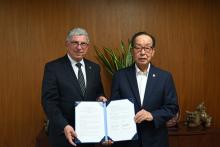With one Research Hub per location, the resource universities in Freiberg (Germany) and Akita (Japan) will work together even more closely from now on. The hub is intended to facilitate research cooperation and initiate new joint research projects. Both universities are thus strengthening their research profile around the sustainable use of raw materials.
In September, the rectors of the two universities, Prof. Dr. Klaus-Dieter Barbknecht (Freiberg) and Prof. Dr. Fumio Yamamoto (Akita) signed a bilateral agreement for expanded cooperation in the two research hubs in Akita and Freiberg. According to the agreement, both locations will each set up a permanent office for visiting researchers from the other university.
"Akita University now has an office in Europe and we in Japan," says TU Rector Prof. Dr. Klaus-Dieter Barbknecht happily. "The already existing cooperation will be significantly intensified with the two Research Hubs. I am sure that the joint research will contribute even better to successfully addressing the global challenges of the future."
"We are delighted to conclude this agreement for the oversea hubs between our universities.” says President of Akita University, Prof. Dr Fumio Yamamoto. We believe that the establishment of hub on each campus would be a wonderful milestone in the history of our fruitful cooperation. We hope that the hub office will promote further academic cooperation as well as student exchange."
Cooperation in research and teaching with a long history
Akita University was founded about 100 years ago as a Mining College, modelled on TU Bergakademie Freiberg. The career of Freiberg metallurgist Curt Adolph Netto, which began 150 years ago and took him all the way to Japan, shows the special connection between TU Bergakademie Freiberg and the Japanese University of Akita.
